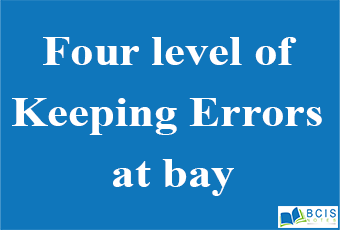
Four level of Keeping Errors at bay
1.Literal Comprehension:
This essay by Bertrand Russell providing multiple examples of mistakes that people generally commit in their day-to-day life. His main idea is to provide suggestions to avoid mistakes. We need a careful, serious, critical, and analytical mind to get rid of these errors. This essay deals with the idea of avoiding errors that happen in our daily life situations. We can remove many foolish opinions by observing the related facts. When observations are impossible, we have to compare our ideas with those of others. If there are evidence and knowledge, there will be no wrong understanding. Visiting different places and observing societies of the world also helps us to purify our own opinions. Knowing other ideas makes us less dogmatic. If we have a one-sided idea about anything, we will not find out the truth, such a situation, we will make our good points more important. Fear and prejudice of different types create obstacles from learning the truth or reality. So we should be very careful while doing any work. We should not take as granted anything without proper observation.
2.Interpretation:
To err is human but to do a mistake is not excusable. Human makes errors knowingly or having known about that error is not human. This is somewhat punishable also. We cannot find truth without proper understanding. The essay tries to tell us why human beings are unable to see the truth. They do not see the matter. They have an illusion that they know everything without knowing it properly. It says that we have some mistakes generally we do not compare our idea with that of others. We unnecessarily feel pride and ignore things. Therefore, we commit crimes or errors. This is human but to do a mistake knowingly cannot be human. There are solutions for errors but not knowingly committing mistakes.
3.Critical Thinking:
Russell gives a very concrete idea about errors and their solutions. He says how and why we do errors and how can we correct them. After reading this story I came to know and have some questions. The essayist has presented a scientific way of thinking. By comparing and contrasting, we can judge our own ideas. I agree with many things which the essayist says but there are some questions in my mind. Who can remain without doing any errors? How can one know that it is an error and this not? Can we change our minds not to doing errors? Why people cannot find out the fact easily? How we can compare such things to those of others? What are the forms of the truth? How do know whose idea is right or wrong? Because of these reasons generally, people commit errors in life.
4.Assimilation:
Generally, we think right whatever we do. This essay gave me lots of ideas about errors and their types as well as their remedies (solution). I started to realize my mistakes in my life as I sometimes used to stubborn and think everything right. I started to honor other’s ideas. I also came to know why people mistake while making ideas. A wise man should look at things from different sides. We should be comparative and multidimensional perspectives should be used. I came to know that we can do errors in every work every time but that is only found out after its proper judgment.

Leave a Reply